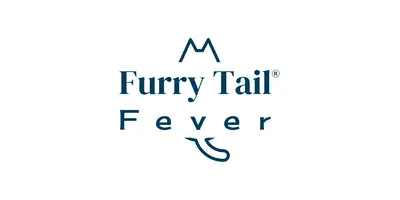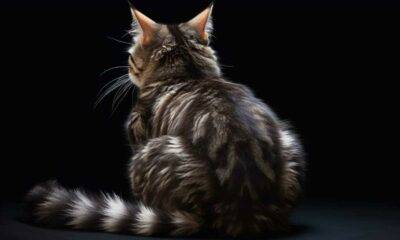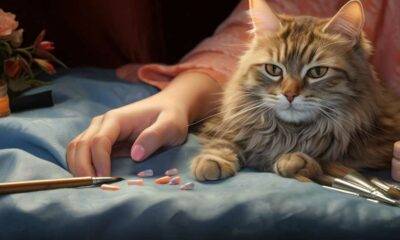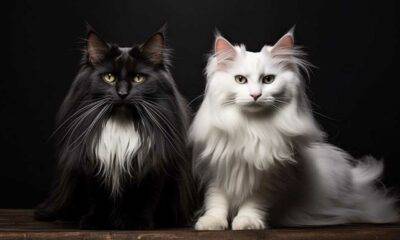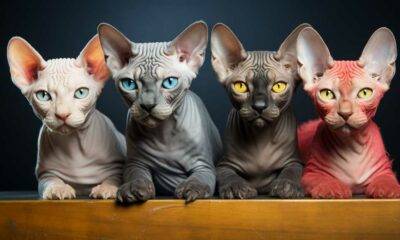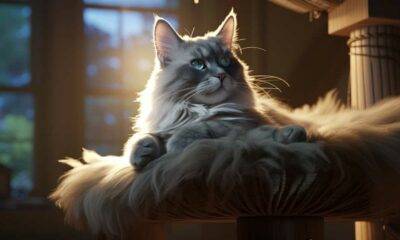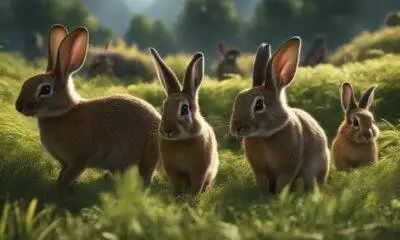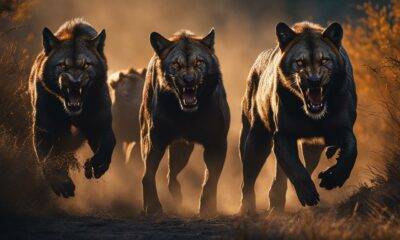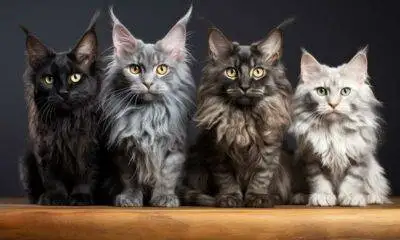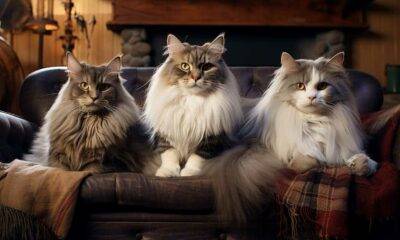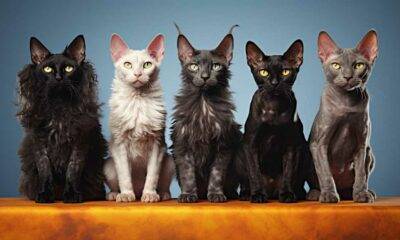cats
Why Is Your Cat Showing Nutritional Deficiency Symptoms?
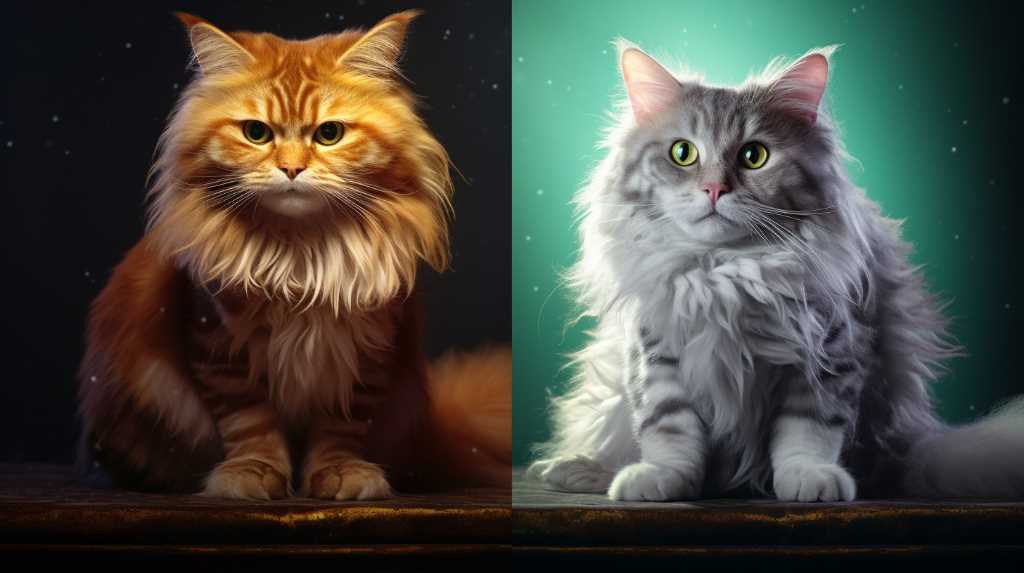
Why Is Your Cat Showing Nutritional Deficiency Symptoms?
Is your cat lacking essential nutrients? Just like a car needs fuel to run smoothly, your cat’s body relies on proper nutrition for optimal health. But what if your furry companion is showing signs of nutritional deficiency? It’s important to understand the reasons behind this and how you can help.
In this article, we’ll explore the common causes of nutritional deficiencies in cats and their impact on overall health. By recognizing these signs and addressing any gaps in their diet, you can ensure your beloved cat gets the nourishment they need to live a happy and healthy life.
Key Takeaways
Recognizing and addressing nutritional deficiencies in your cat is crucial for their well-being. These deficiencies can have a significant impact on their overall health and should not be overlooked. Keep an eye out for symptoms such as a dull coat, weight loss, and digestive issues, as these could indicate a lack of essential vitamins and minerals in their diet.
By addressing these nutritional gaps, you can help your feline companion thrive and enjoy a healthier, happier life. It’s important to provide them with a balanced diet that meets all their nutritional needs. Remember, a well-nourished cat is a happy cat.
Recognizing Nutritional Deficiency Signs
Recognizing Signs of Nutritional Deficiency in Cats
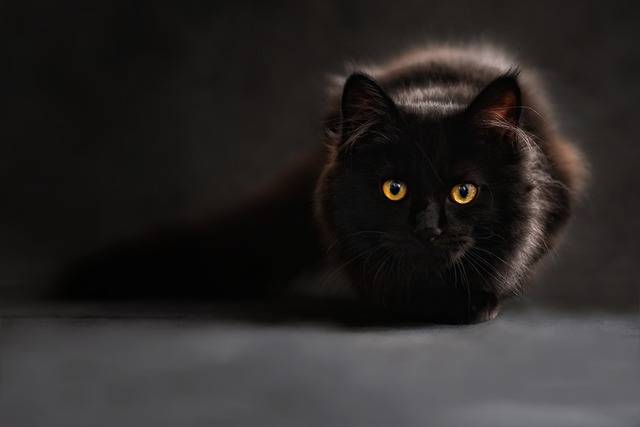
It’s important to be able to recognize signs of nutritional deficiency in your cat, as it plays a crucial role in their overall health and well-being.
One common indicator of inadequate nutrition is a dull and unkempt coat. If your cat’s fur looks lackluster, dry, or brittle, it may suggest a deficiency in essential fatty acids or other vital nutrients.
Another consequence of poor nutrition is weight loss or inadequate weight gain. If your cat isn’t maintaining a healthy weight despite regular feedings, it could be a sign of nutrient deficiencies.
Additionally, cats with nutritional deficiencies may experience reduced muscle mass and weakness. If your cat appears lethargic or struggles with jumping or climbing, it may be due to inadequate nutrition.
Common Deficiencies in Feline Diet
Common Nutritional Deficiencies in a Cat’s Diet
One prevalent issue in a cat’s diet is the lack of essential vitamins and minerals. This deficiency can have various negative effects on their health. To ensure your cat’s well-being, it’s crucial to provide them with a balanced diet that includes all the necessary nutrients.
Let’s discuss three common nutritional deficiencies in a feline diet and their potential consequences:
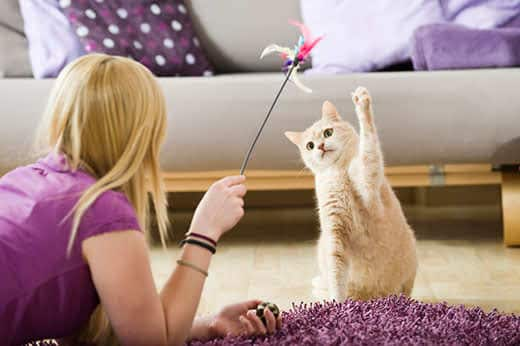
- Vitamin A Deficiency: When cats don’t get enough vitamin A, it can lead to problems with their vision, skin, and immune system. Ensuring they’ve an adequate intake of this vitamin is essential for their overall health.
- Taurine Deficiency: Taurine is vital for a cat’s heart health and vision. If they lack taurine in their diet, it can result in heart abnormalities and vision impairment. Making sure they receive enough taurine is crucial for their well-being.
- Calcium Deficiency: Insufficient calcium intake can weaken a cat’s bones and teeth, which can lead to conditions like dental disease or osteoporosis. Providing them with enough calcium is necessary to maintain their bone and dental health.
Impact of Diet on Feline Health
The impact of diet on your cat’s health is significant. Proper nutrition plays a vital role in their overall well-being. Cats need a balanced diet that provides all the necessary nutrients in the right proportions. A balanced diet supports their immune system, helps maintain a healthy weight, and prevents various health issues.
Food allergies can also have a significant impact on feline health. Certain ingredients can cause allergies, leading to symptoms like skin irritations, digestive problems, and respiratory issues. It’s crucial to identify and avoid allergens to ensure your cat’s well-being.
Therefore, providing a nutritionally balanced diet that meets their specific needs and avoids potential allergens is essential for their optimal health and longevity.
Symptoms of Vitamin and Mineral Shortages
If your cat is showing symptoms of nutritional deficiency, it may be lacking important vitamins and minerals. These deficiencies can have a negative impact on your cat’s overall health and well-being.
Here are three common symptoms that may indicate a shortage of vitamins or minerals in your cat:
- Dull coat and skin problems: A lack of essential fatty acids, like omega-3 and omega-6, can cause dry, flaky skin and a lackluster coat. These nutrients are crucial for maintaining healthy skin and promoting a shiny, vibrant coat.
- Weak immune system: Insufficient levels of vitamins A, C, and E can compromise your cat’s immune system. This can make your cat more vulnerable to infections, illnesses, and slow healing.
- Poor growth and development: Calcium, phosphorus, and vitamin D are vital for proper bone growth and development in cats. If your cat lacks these nutrients, it may experience stunted growth and weakened bones.
Preventing these deficiencies and ensuring a balanced diet is essential for your cat’s overall health and vitality.
Addressing Nutritional Gaps in Cat’s Diet
To make sure your cat is getting all the necessary nutrients, it’s important to address any nutritional gaps in their diet. One way to do this is by providing them with a balanced and nutritious cat food that meets their specific needs. Look for cat foods that are labeled as complete and balanced, as they’re specifically formulated to provide all the essential vitamins and minerals.
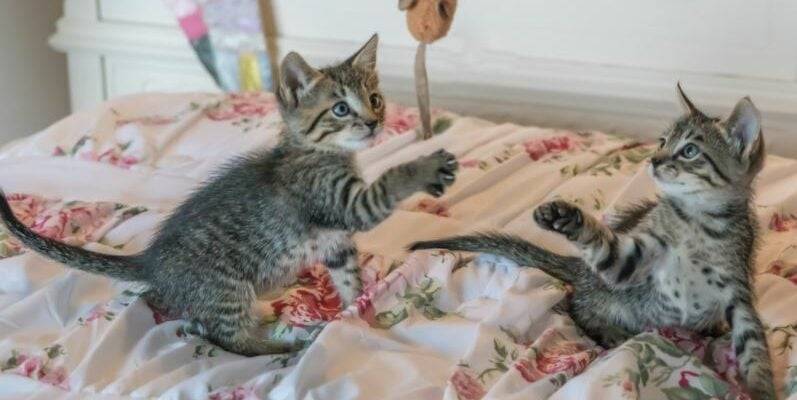
If needed, you can also consult with a veterinarian about adding supplements to their diet. These supplements can help fill any nutrient gaps and ensure your cat is getting everything they need. It’s always a good idea to discuss any changes to your cat’s diet or the addition of supplements with your vet to ensure they’re appropriate for your cat’s individual needs.
Frequently Asked Questions
How Can I Prevent My Cat From Developing Nutritional Deficiencies?
To ensure your cat stays healthy and avoids nutritional deficiencies, it’s important to pay attention to their diet. Make sure to provide them with a well-balanced and nutritious cat food that meets their specific dietary needs. There are many different options available, so take the time to explore and find the one that works best for your cat. Remember, a proper diet is essential for your cat’s overall well-being.
Are There Any Specific Cat Breeds That Are More Prone to Nutritional Deficiencies?
Certain cat breeds may have a higher risk of nutritional deficiencies due to their genetic makeup. Different breeds have unique metabolism rates, dietary requirements, and body compositions. It is essential to understand these specific needs to ensure that your cat receives proper nutrition and maintains optimal health. By addressing breed-specific nutritional requirements, you can prevent deficiencies and support your cat’s overall well-being.
Can Nutritional Deficiencies in Cats Lead to Long-Term Health Issues?
Nutritional deficiencies in cats can have significant long-term health consequences. It is essential to provide them with a well-balanced diet to prevent such issues. Keep a close eye on your cat for any signs of nutritional deficiency and consult a veterinarian for expert guidance. Taking proactive measures in their diet can ensure their overall well-being and prevent potential health complications down the line. Remember, a healthy diet is the cornerstone of a happy and thriving feline companion.
Is It Possible for Cats to Develop Allergies or Sensitivities to Certain Nutrients?
Cats can develop sensitivities to certain nutrients, leading to nutrient allergies. Common allergens for cats include beef, dairy, fish, and grains. These allergies can cause various symptoms such as skin irritations, gastrointestinal issues, and respiratory problems. It’s important to be aware of these sensitivities and provide appropriate care for your feline companion.
Should I Consult a Veterinarian if I Suspect My Cat Has a Nutritional Deficiency?
If you suspect that your cat may have a nutritional deficiency, it is crucial to seek guidance from a veterinarian. A veterinarian will be able to evaluate the symptoms and conduct a thorough examination to determine the underlying cause of the deficiency. They can then provide appropriate recommendations for treatment and help ensure your cat’s overall well-being. Remember, consulting a veterinarian is essential for accurate diagnosis and tailored care for your furry friend.
Conclusion
To ensure the well-being of your cat, it’s important to recognize and address any symptoms of nutritional deficiency. These deficiencies can have a significant impact on your cat’s overall health.
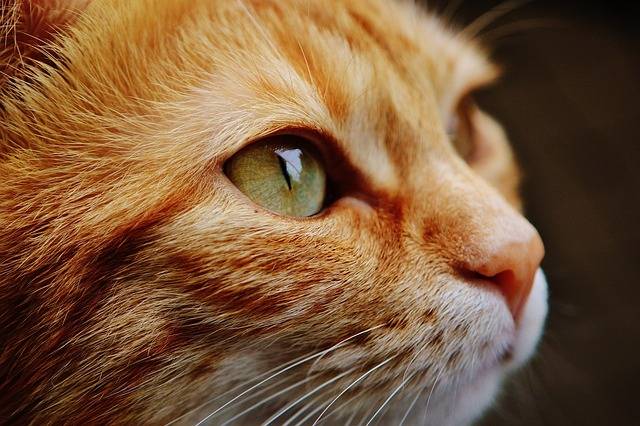
Keep an eye out for signs such as a dull coat, weight loss, and digestive issues, as these may indicate a lack of essential vitamins and minerals in their diet.
By addressing these nutritional gaps, you can help your feline companion thrive and enjoy a healthier, happier life. Remember, a balanced diet is the key to their well-being.
table, th, td { border: 1px solid black; border-collapse: collapse; padding: 10px;}
cats
Little Kitten My Favorite Cat – Play Fun Pet Care Kids Game – Fun Games For Kids & Children

By: ArcadeGaming
Title: Little Kitten My Favorite Cat – Play Fun Pet Care Kids Game – Fun Games For Kids & Children
Sourced From: www.youtube.com/watch?v=Hyju6Gwo_gs
cats
Guy Thinks He’s Lost His Foster Cat | The Dodo

By: The Dodo
Title: Guy Thinks He”s Lost His Foster Cat | The Dodo
Sourced From: www.youtube.com/watch?v=Jn4YJr_pWzY
cats
How To Train Your Cat: Two Methods You Need To Know

By: Cat School Clicker Training
Title: How To Train Your Cat: Two Methods You Need To Know
Sourced From: www.youtube.com/watch?v=LJVQINS8xFk
-

 cats7 months ago
cats7 months agoHow to Get Your Cats to Stop… Everything You Hate: Every No Needs a Yes!
-

 All Animals1 year ago
All Animals1 year agoALL about Lagomorphs Explained!
-

 All Animals10 months ago
All Animals10 months agoExplore the Wilderness: ALL about Carnivores Unleashed!
-

 Animals1 year ago
Animals1 year agoThe Wonders: ALL About Artiodactyls
-

 Cat Breeds6 months ago
Cat Breeds6 months agoWhat Are Some Rare Domestic Cat Breeds?
-

 Cat Breeds6 months ago
Cat Breeds6 months agoWhat Are the Top Family-Friendly Domestic Cat Breeds?
-

 Cat Breeds6 months ago
Cat Breeds6 months agoDiscover Rare Domestic Cat Breeds With Our Guide
-

 Cat Breeds6 months ago
Cat Breeds6 months agoTop Family-Friendly Domestic Cat Breeds
